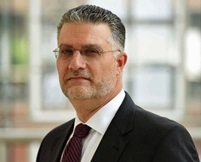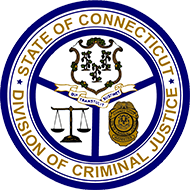Office of the Chief State's Attorney
Located in Rocky Hill, Connecticut, the Office of the Chief State's Attorney is responsible for the statewide administrative functions of the Division of Criminal Justice. In addition to budget, personnel and other administrative functions, the Office of the Chief State's Attorney includes specialized units for the investigation and prosecution of certain criminal matters and for representing the state in appellate and other legal matters.
Follow this link for more information on the specialized bureaus and programs in the Office of the Chief State's Attorney: Appellate Bureau, Civil Litigation Bureau, Statewide Prosecution Bureau, Medicaid Fraud Control Unit, Witness Protection Program and Workers' Compensation Fraud Control Unit.
Follow this link for a listing of State's Attorneys and their office locations.
For more information, contact:
State of Connecticut
Division of Criminal Justice
Office of the Chief State's Attorney
300 Corporate Place
Rocky Hill, CT 06067
Telephone:
860-258-5800
Business Hours:
9 a.m. to 5 p.m.
Monday through Friday
Directions: Interstate 91 Exit 23 Follow green highway directional signs to "Chief State's Attorney"
Follow this link to e-mail the Chief State's Attorney. NOTE: In accordance with State of Connecticut security protocols, the Division of Criminal Justice cannot accept unsolicited email attachments. Unless this agency has specifically asked you to submit an attachment, all information must be submitted as plain text in the body of the email.
CHIEF STATE'S ATTORNEYS OF CONNECTICUT
Richard J. Colangelo, Jr.
January 31, 2020 - Present
John J. Russotto, Acting Chief State's Attorney
December 1, 2019 - January 31, 2020
Kevin T. Kane
2006 - 2019
Christopher L. Morano
2002 - 2006
John M. Bailey
1993-2002
Richard N. Palmer
1991-93
John J. Kelly
1985-91
Austin J. McGuigan
1978-85
Joseph T. Gormley
1973-78
About the Chief State's Attorney
 Richard J. Colangelo, Jr. was sworn in as Chief State's Attorney on January 31, 2020. As Chief State's Attorney, he is the chief law enforcement officer of the State of Connecticut and administrative head of the Division of Criminal Justice, the independent agency in the executive branch of state government that is responsible for the investigation and prosecution of all criminal matters in Connecticut.
Richard J. Colangelo, Jr. was sworn in as Chief State's Attorney on January 31, 2020. As Chief State's Attorney, he is the chief law enforcement officer of the State of Connecticut and administrative head of the Division of Criminal Justice, the independent agency in the executive branch of state government that is responsible for the investigation and prosecution of all criminal matters in Connecticut.
A career prosecutor, Chief State's Attorney Colangelo joined the Division of Criminal Justice in March 1993 and served in various capacities until his appointment as State's Attorney for the Judicial District of Stamford/Norwalk on July 1, 2015.
An active trial prosecutor who has tried all types of major felony cases, he also has been intricately involved in criminal investigations and criminal justice education. Throughout his career as a prosecutor, Colangelo has specialized in cases of child exploitation, both severe physical and sexual abuse, and child sexual exploitation cases involving the internet.
Chief State's Attorney Attorney Colangelo is a graduate of Norwalk State Technical College (A.S.M.E. 1986), the University of Connecticut (B.S.M.E. 1989) and the Quinnipiac School of Law (J.D. 1992). He has taught in Criminal Justice programs in the Connecticut community college system since 1995, at the University of New Haven since 2013, and the National Computer Forensics Institute in Hoover, Alabama, since 2011. Attorney Colangelo is the Chairman of the State Board of Examiners for Psychologists, Chairman of the Easton Police Commission, President of the Human Services Council Board of Directors in Norwalk, a member of the Boys and Girls Club of Redding-Easton Board of Directors, and a member of the Eyewitness Identification Task Force. He has presented on various topics at area schools, businesses and parent groups.
- Follow this link to e-mail the Chief State's Attorney. NOTE: In accordance with State of Connecticut security protocols, the Division of Criminal Justice cannot accept unsolicited email attachments. Unless this agency has specifically asked you to submit an attachment, all information must be submitted as plain text in the body of the email.
Specialized Units in the Office of the Chief State's Attorney
The Chief State's Attorney's Office operates the following specialized bureaus:
Appellate Bureau
The Appellate Bureau is responsible for representing the State of Connecticut in the vast majority of appeals challenging criminal convictions. This bureau, which employs approximately twenty-five prosecutors, prepares written legal arguments (briefs) and presentations (oral argument) before the Connecticut Supreme Court and the Connecticut Appellate Court.
In any given year, the Bureau will have some 800 separate cases pending before the state's appeals courts and another dozen before the United States Supreme Court. Among these cases are appeals of the convictions of those sentenced to death in Connecticut.
The centralization of appellate litigation in a single bureau serving the entire State permits prosecutors to become appellate specialists. These attorneys track development and trends throughout the state's trial courts, and also conduct important research for the Chief State's Attorney on criminal justice issues and training.
Civil Litigation Bureau
The Civil Litigation Bureau is primarily responsible for state and federal habeas corpus actions in which a convict challenges the lawfulness of his or her criminal conviction in a civil court action. The Civil Litigation Bureau also is responsible for responding to civil subpoenas of investigative and other records of the Division of Criminal Justice or seeking injunctive or declaratory relief.
Criminal Housing Matters
The Division of Criminal Justice is responsible for the prosecution of criminal housing matters through the Supervisory Assistant State's Attorney for Housing Matters in the Office of the Chief State's Attorney and prosecutors assigned to the Superior Court housing sessions statewide. Housing prosecutors are committed to the maintenance of decent, safe and sanitary housing, handling cases from investigation through criminal trial.
Medicaid Fraud Control Unit
The Medicaid Fraud Control Unit investigates and prosecutes fraud and abuse, including physical abuse and neglect of patients, in facilities that receive funding from Medicaid, a state and federally funded program that pays health care expenses for low-income individuals.
Statewide
Prosecution Bureau/Cold Case Unit/Witness Protection Unit
The Statewide Prosecution Bureau is responsible for the investigation and prosecution of "white collar" crimes, including government corruption. Program areas include criminal violations of the environmental protection laws, government corruption and other offenses against public integrity. The bureau includes the Cold Case Unit, which is responsible for the investigation and prosecution of serious crimes that have gone "cold," or unsolved for a long period of time. The cases assigned to this Unit typically include unsolved murders, some of which took place decades ago. The Unit works closely with the State's Attorneys, the Connecticut State Police, municipal police departments, and nationally recognized forensics experts, utilizing the latest technology to solve these crimes.
The LeRoy Brown, Jr. and Karen Clarke Witness Protection Program is also operated under the Statewide Prosecution Bureau. This statewide program operates in cooperation with the State's Attorneys and local, state and federal law enforcement agencies to identify and protect witnesses in criminal proceedings where there is evidence of substantial danger that the witness may suffer from intimidation or retaliatory violence. The unit was formally created in 1999 with the enactment of Public Act 99-240, which established the Leroy Brown, Jr. and Karen Clarke Witness Protection Program.
Through a variety of means, tailored to the individual circumstances presented by each witness, the Witness Protection Unit coordinates protection both to protect their safety and the interest of justice. Services can include temporary relocation, semi-permanent relocation in or outside of Connecticut and police protection. The Unit provides some form of assistance to approximately 200 individuals each year.
Workers' Compensation Fraud Control Unit
The Workers' Compensation Fraud Control Unit has two primary goals: the prosecution of fraud against the Workers' Compensation system, which compensates workers who are injured on the job, and public awareness of the problem of Workers' Compensation fraud.

